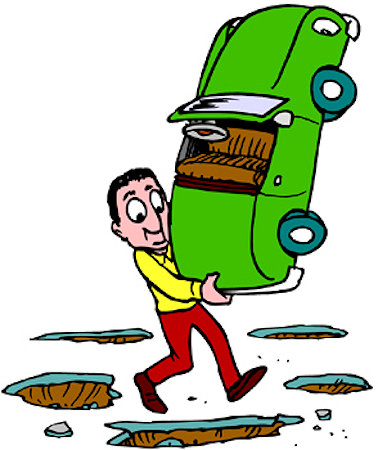


Mobile users:
For best results, view in Landscape mode.

Pothole damage can be expensive
in car repairs.
Hit one and you could damage your car's wheel rims,
steering, suspension, exhaust, and flat tires.
Don't treat your car like you see in those TV commercials
who take their cars over rocks and other obstacles like
they're driving a monster truck.
Be sure your tires are properly inflated, have enough tread,
and that your car's suspension parts are in good condition.
They're more likely to survive the impact if they're up to par.
Low tire pressure can cause bulges or blisters on the sidewalls
of the tires and even dent the wheel.
A tire that is under or over inflated is more susceptible to damage
when you hit a pothole.
Make sure your struts, shock absorbers and other suspension
parts are in good condition.
Worn shocks provide little protection against potholes.
Hitting potholes can knock the wheels out of alignment
and affect the steering, which is common after hitting a deep
pothole.
If your car pulls to the left of right, have the wheel alignment
checked by your mechanic.
If your steering wheel is shaking after hitting a pothole, there
maybe damage to a tire or rim.
If you hear strange noises after hitting a pothole it could mean
that you’ve damaged something within your car’s exhaust
system.
Talk to your mechanic as soon as possible.
Make a point of checking the road ahead for potholes.
Being alert, you may have time to avoid potholes, so it’s
important to stay focused on the road and not any
distractions inside or outside your car.
If potholes can't be avoided, reduce speed safely being sure
to check the rear-view mirror before you suddenly brake.
Also check surrounding traffic to ensure this won’t cause
a collision or endanger nearby pedestrians
or bicyclists.
Slow down.
Hitting a pothole at higher speeds greatly increases the chance
of damage to tires, wheels and suspension components.
Don't swerve at the last minute to avoid it.
Your car could hit the pothole on an odd angle, causing more
damage to the tire, wheel rim and alignment.
Keep your eyes focused on the road and slow down before you
hit it and firmly grip the wheel to help avoid losing control of
your car.
Hitting a pothole with a loose grip can cause you to lose
control of your car.
You should maintain a safe distance between your car and
the car in front of you so it’s easier to spot potholes ahead.
Brake lightly.
Hitting your brakes hard can cause greater tire damage and to
your suspension system.
Brake before you hit the pothole, not when you hit it.
But don’t brake directly over a pothole, which can actually
cause more damage.
Just coast over the pothole.
Also use caution when approaching puddles of water as they
could really be potholes in hiding.
Puddles can disguise deep potholes.
If you hit a deep pothole, survey the damage as soon as
you can do so safely.
Check for fluid leaking from the underbody and listen for rattling
when driving.
Make sure your tires are still inflated in order to reduce damage
to wheel rims.
You should check your tires frequently if you drive over a lot
of potholes.
Look for blisters or bulges on the tire sidewalls or dents in the
wheel rims.
Make sure they remain properly inflated to the PSI listed on the
sticker in your car door frame or owner's manual.
If you live in the City of Milwaukee and would like to report
potholes on the street where you live and / or work,
contact the Department of Public Works for repair.
(414) 286-CITY (2489)
If you live in a Milwaukee suburb, or outside of the
Milwaukee area, or even outside of Wisconsin,
contact your local municipality to report any potholes
in your area.

